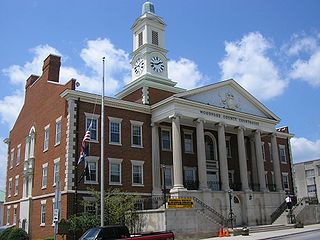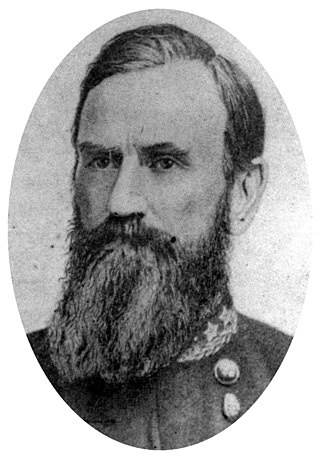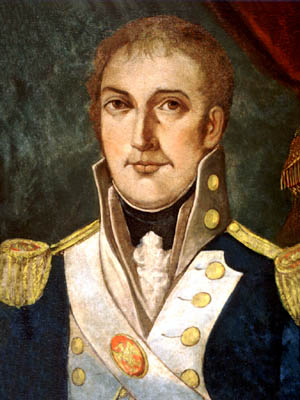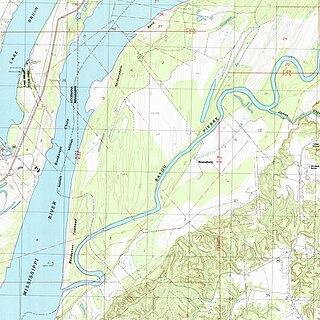Related Research Articles

Claiborne County is a county located in the U.S. state of Mississippi. As of the 2020 census, the population was 9,135. Its county seat is Port Gibson. The county is named after William Claiborne, the second governor of the Mississippi Territory.

Woodford County is a county located in the U.S. state of Kentucky. As of the 2020 census, the population was 26,871. Its county seat is Versailles. The area was home to Pisgah Academy. Woodford County is part of the Lexington-Fayette, KY Metropolitan Statistical Area. It is located in the center of the Bluegrass region of Kentucky.

Port Gibson is a city and the county seat of Claiborne County, Mississippi, United States. The population was 1,567 at the 2010 census. It is bordered on the west by the Mississippi River.

Benjamin Grubb Humphreys was an American politician from Mississippi. He was a general in the Confederate States Army during the American Civil War and served as Governor of Mississippi from 1865 to 1868, during Reconstruction.

William Charles Cole Claiborne was an American politician and military officer who served as the first governor of Louisiana from April 30, 1812 to December 16, 1816. He was also possibly the youngest member of the United States Congress in the history of the United States, although reliable sources differ about his age.

Grand Gulf is a ghost town in Claiborne County, Mississippi, United States.
Varyon Cullie Shannon, known as V. C. Shannon, was a Democratic member of the Louisiana House of Representatives from Shreveport in Caddo Parish in northwestern Louisiana. He served from 1972 until 1979. He was the first to hold the newly created District 4 seat, having been successful in the general election held on February 1, 1972.

Bruinsburg is an extinct settlement in Claiborne County, Mississippi, United States. Founded when the Natchez District was part of West Florida, the settlement was one of the end points of the Natchez Trace land route from Nashville to the lower Mississippi River valley.
Jeremiah Chamberlain (1794–1851) was an American Presbyterian minister, educator and college administrator. Educated at Dickinson College and Princeton Theological Seminary, he served as the president of Centre College in Kentucky from 1822 to 1825.
Patton Jones Yorke was a plantation owner and politician in Louisiana. He represented Carroll Parish in the Louisiana House of Representatives. He served from 1868 to 1873.
Port Gibson High School is a public high school in unincorporated Claiborne County, Mississippi, with a Port Gibson. It opened in 1924. It is part of the Claiborne County School District. The student body is 99 percent African American. The old Port Gibson High School campus is now used by Port Gibson Middle School and is listed on the National Register of Historic Places.
Thomas Freeland was a state legislator and delegate to the 1832 Mississippi Constitutional Convention in Mississippi. He served as state senator representing Claiborne County from 1823 to 1829 except in 1827 when Daniel Burnett held the office.
Parmenas Briscoe was an American planter and longtime state legislator in Mississippi. He represented Claiborne County in the Mississippi House of Representatives and Mississippi Senate on and off between 1828 and 1850. He also was the second President of the Mississippi State Senate, serving from 1834 to 1836.
William M. Hancock was a judge and state legislator in Mississippi. His father was Judge Jubal Braxton Hancock.
Nelson Green Gill was a state legislator and school organizer in Mississippi. He organized a school for African American students in Holly Springs, Mississippi. Mrs. Gill was also involved with the school. He represented Marshall County, Mississippi in the Mississippi House of Representatives in 1874 and 1875. He was white. He was a Republican.

Joseph Smothers was a Baptist minister and state legislator in Mississippi. He represented Claiborne County in the Mississippi House of Representatives from 1872 to 1875.
Freeman E. Franklin was a state legislator in Mississippi. He served as Speaker of the Mississippi House of Representatives in 1870.
Lock E. Houston was a judge and state legislator in Mississippi. He served as Speaker of the Mississippi House of Representatives. He served in the Mississippi House during the American Civil War.
James Pinckney Scales was a lawyer and state legislator in Mississippi. He served in the Mississippi House of Representatives including as the 29th Speaker of the House. He was from a prominent family. He was a Confederate officer during the American Civil War.
Finis H. Little was a state legislator in Mississippi. A Republican, he served during the Reconstruction era. He served with F. M. Abbott from the 22nd District. He served as president pro tem of the state senate and chaired its finance committee.
References
- 1 2 Biographical and Historical Memoirs of Mississippi: Volume II, Part II. Pelican Publishing. April 1, 1999. ISBN 9781565546097 – via Google Books.
- ↑ "History of Claiborne County". www.msgw.org.
- ↑ Lowry, Robert; McCardle, William H. (July 2, 1891). A History of Mississippi: From the Discovery of the Great River by Hernando DeSoto, Including the Earliest Settlement Made by the French Under Iberville, to the Death of Jefferson Davis. AMS Press. ISBN 9780404046101 – via Google Books.
- ↑ "Farm Chemicals Handbook". Meister Publishing Company. July 2, 1909 – via Google Books.
This article needs additional or more specific categories .(July 2021) |